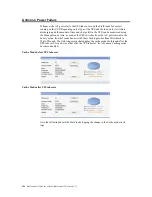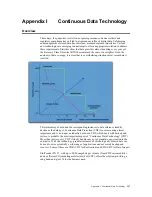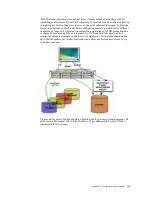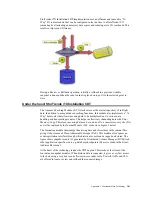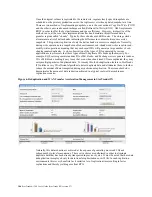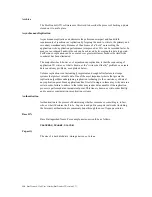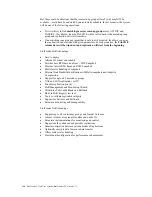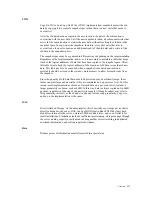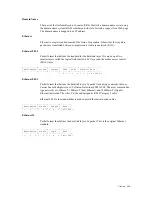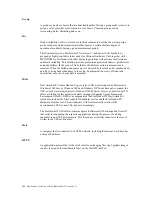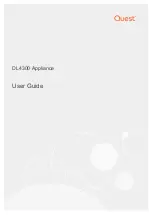
StorTrends® 1300 User’s Guide (StorTrends iTX version 2.7)
308
Once the original volume is replicated to the remote site, regular closely spaced snapshots are
scheduled on the primary production server; the replica server is then updated snapshot at a time.
There are two methods of implementing snapshots: one is the conventional Copy-On-Write (COW)
and the other is a more advanced technique called Redirect-On-Write (ROW). AMI implements
ROW in order to offer the best performance and space efficiency. However, irrespective of the
method in use, at the core these implementations track and maintain this difference data in
granular regions called “chunks”. Typically, these chunks are 64KB in size. The storage stacks
also maintain a list of delta chunks indicating the difference in contents between successive
snapshots. This permits replication of only the delta chunks in successive snapshots. Normally,
during write operations in a snapshot enabled environment, sub-chunk sized writes result in read-
modify-write operations, meaning that any such small I/Os will generate a large number of sub-
chunk granular duplicates. A close observation of the types of I/Os generated by various
application servers reveals that these types of small, duplicate I/Os make up the majority. For
example, SQL servers generate random I/Os of 8K blocks, and Exchange servers generate random
I/Os of 4K blocks, making it easy to see that even when chunk sized I/Os are replicated, they may
carry multiple packets of duplicated data. To remedy this, the deduplication feature in StorTrends
iTX utilizes a very I/O-efficient algorithm to detect duplicate data and eliminates them, to further
reduce the amount of data transported during asynchronous replication. The screenshot below
demonstrates the amount of data reduction achieved in a typical real-world asynchronous
replication scenario.
Figure 6: Deduplication and WAN Transfer Acceleration Management in StorTrends iTX
Naturally, this data reduction is achieved at the expense of generating more read I/Os and
subsequent byte-level comparisons. These extra chores are performed in order to eliminate
duplicate data that has been already transported in previous cycles. It must be noted that here data
deduplication is employed only for data transfer optimizations over WAN. In such replication
environments this is very beneficial as it curtails a lot of replication time resulting in faster
replications and thereby yielding excellent RPO.
Summary of Contents for ManageTrends 2.7
Page 18: ...StorTrends 1300 User s Guide StorTrends iTX version 2 7 xviii...
Page 24: ...StorTrends 1300 User s Guide StorTrends iTX version 2 7 6...
Page 33: ...Chapter Two Chassis Set Up 15 Accessing the Inside of the System...
Page 60: ...StorTrends 1300 User s Guide StorTrends iTX version 2 7 42...
Page 64: ...StorTrends 1300 User s Guide StorTrends iTX version 2 7 46...
Page 70: ...StorTrends 1300 User s Guide StorTrends iTX version 2 7 52...
Page 100: ...StorTrends 1300 User s Guide StorTrends iTX version 2 7 82...
Page 106: ...StorTrends 1300 User s Guide StorTrends iTX version 2 7 88 Control Panel...
Page 236: ...StorTrends 1300 User s Guide StorTrends iTX version 2 7 218...
Page 256: ...StorTrends 1300 User s Guide StorTrends iTX version 2 7 238...
Page 277: ...Appendix E Replication Overview 259 Snap Assisted Replication Navigating with ManageTrends...
Page 281: ...Appendix E Replication Overview 263 Replication SAR view Primary Box SAR view Secondary Box...
Page 285: ...Appendix E Replication Overview 267 After Failover Operation in Secondary Box...
Page 300: ...StorTrends 1300 User s Guide StorTrends iTX version 2 7 282...
Page 308: ...StorTrends 1300 User s Guide StorTrends iTX version 2 7 290...
Page 330: ...StorTrends 1300 User s Guide StorTrends iTX version 2 7 312...
Page 356: ...StorTrends 1300 User s Guide StorTrends iTX version 2 7 338...

